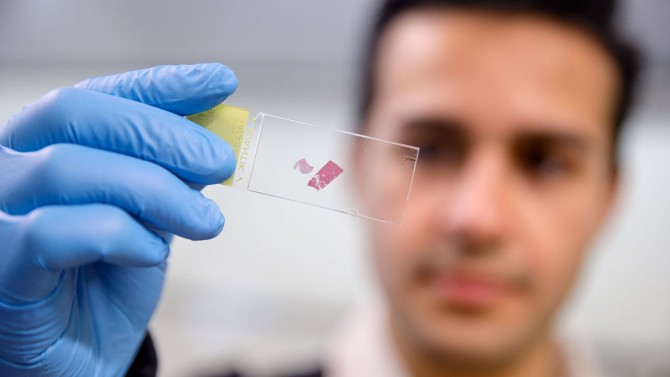Kaavian Shariati ’20, a biomedical engineering major, at work in the lab of Minglin Ma, associate professor in the Department of Biological and Environmental Engineering in the College of Agriculture and Life Sciences.
For a student with diabetes, research is power
By Melanie Lefkowitz
When Kaavian Shariati ’20 learned he had Type 1 diabetes shortly before arriving at Cornell, he was shocked not only by his new responsibilities – monitoring his insulin levels day and night – but by the state of diabetes research.
“Most of the innovation has been in trying to find new ways to administer insulin or develop new types of insulin. But at the end of the day, that’s not really a functional cure,” says Shariati, a biomedical engineering major in the College of Engineering’s Nancy E. and Peter C. Meinig School of Biomedical Engineering. “After the diagnosis, I knew I wanted to have something to do with trying to actually develop better solutions.”
For Shariati, joining the lab of Minglin Ma, associate professor in the Department of Biological and Environmental Engineering in the College of Agriculture and Life Sciences, was both empowering and illuminating. He learned firsthand what a difficult problem diabetes presents, and about the promising cutting-edge research happening at Cornell.
“Being diabetic teaches you only the very surface-level aspects of the condition; being in this lab, performing the research, gave me a better opportunity to actually understand the mechanisms behind it,” he says.
At Cornell, nearly a quarter of all undergraduates earn credit for participating in research. The university encourages undergraduate research with programs such as the Hunter R. Rawlings III Cornell Presidential Research Scholars, which provides resources for up to 200 undergraduates each year to conduct research with faculty mentors, and the Humanities Scholars Program, which provides accepted applicants with research opportunities, courses, mentorship, programming and funding.
In Ma’s lab, Shariati worked with researchers pioneering promising cell-based therapies that could potentially eliminate the need for insulin injections. “We want to push this as far as we can, with the ultimate goal of putting it into patients and helping people,” says Ma, whose team was awarded $7 million by the pharmaceutical giant Novo Nordisk in 2018 to develop a nanofibrous device that could be engineered to deliver the insulin-producing cells to patients.
“The mere presence of opportunities to pursue research in whatever category we would like has been huge for me,” Shariati says. “It totally adjusted my career trajectory. It helped me identify a path for myself.”
This story originally appeared in the online-only spring 2020 issue of Ezra magazine.
Media Contact
Get Cornell news delivered right to your inbox.
Subscribe


